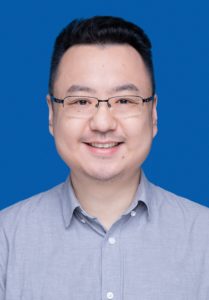 Ray received his Ph.D. degree from the Ohio State University, U.S, following two years postdoctoral training in Stockholm University, Sweden. He took up a faculty position at Central South University, China, where he is now a full professor. His research topics cover a diverse set of organic contaminants related investigations. He is interested in understanding how to remove trace organic contaminants using advanced oxidation technologies and how to develop different modelling tools to predict reaction kinetics and mechanisms. He has received over 5 M (RMB) in research funding and has over 80 publications. His h-index is 35, and there are 15 papers selected as ESI (Essential Science Indicator) 1% highly cited papers. He was awarded for excellent reviewers for many renowned journals. He also severs as associate editor for Environmental Chemistry Letters, editorial boards for Chemical Engineering Journal, Process Safety and Environmental Protection, and Scientific Reports.
Ray received his Ph.D. degree from the Ohio State University, U.S, following two years postdoctoral training in Stockholm University, Sweden. He took up a faculty position at Central South University, China, where he is now a full professor. His research topics cover a diverse set of organic contaminants related investigations. He is interested in understanding how to remove trace organic contaminants using advanced oxidation technologies and how to develop different modelling tools to predict reaction kinetics and mechanisms. He has received over 5 M (RMB) in research funding and has over 80 publications. His h-index is 35, and there are 15 papers selected as ESI (Essential Science Indicator) 1% highly cited papers. He was awarded for excellent reviewers for many renowned journals. He also severs as associate editor for Environmental Chemistry Letters, editorial boards for Chemical Engineering Journal, Process Safety and Environmental Protection, and Scientific Reports.
Read his Emerging Investigator article “Emerging investigator series: Could superoxide radical be implemented in decontamination processes?” and read more about him in the interview below:
Your recent Emerging Investigator Series paper focuses on superoxide radicals. How has your research evolved from your first article to this most recent article?
I did ultrasound sonochemistry for my Ph.D. degree back in Columbus Ohio. I remember one of reactive oxidative species bursting from cavitation bubbles was said to be superoxide radical. For a long period of time, I really wanna understand what kinds of role does it play and how it can be implemented into decontamination processes. But I cannot find too much information on this radical from environmental engineering perspective. So shortly after being academically independent, me and my students developed a reliable approach to generate superoxide radical at micromolar level in aqueous solution. We then constructed an in situ long-path spectroscopy to investigate the kinetics and mechanisms of superoxide-mediated degradation of various organic contaminants. This perspective is based on our knowledge accumulation on superoxide radical these years. We hope that the perspective motivates researchers in the field of water quality and treatment for further exploration of this exciting area.
What aspect of your work are you most excited about at the moment?
I am really into the reactivity and reaction mechanisms of superoxide radical with various organic contaminants. The fundamental knowledge we gained will be beneficial to environmental engineers/chemists.
In your opinion, what are the most important questions to be asked/answered in this field of research?
In this paper, we emphasize challenges that we are facing ahead (e.g., lack of solid kinetic reactivity data, unclear synergistic mechanisms with other ROS). We believe that the environmental applications of superoxide chemistry deserve more thorough debate in the water engineering communities,
What do you find most challenging about your research?
I found elucidation of reaction mechanism is always a difficult task to do, especially in a complex system with different kinds of radicals coexisting.
In which upcoming conferences or events may our readers meet you?
I usually attend the ACS conference and National Conference on Environmental Chemistry in China.
How do you spend your spare time?
With my family. I spend lots of time with my daughter Jiyuan.
Which profession would you choose if you were not a scientist?
I am very passionate about writing. If I didn’t embark on the academic path, I guess I could be a novel writer?
Can you share one piece of career-related advice or wisdom with other early career scientists?
I am honored to be able to share some of my professional experience here. I did learn a lot is that we should be bold and try hard when good ideas come to minds right away.










